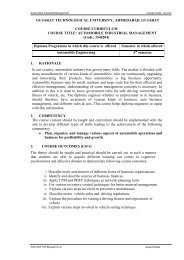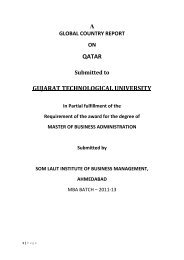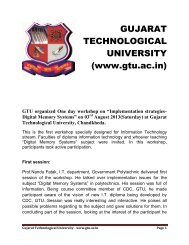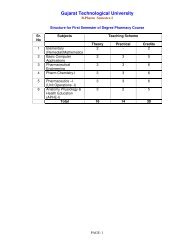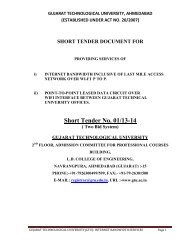751-Sabar Institute Of Management, Tajpur - Gujarat Technological ...
751-Sabar Institute Of Management, Tajpur - Gujarat Technological ...
751-Sabar Institute Of Management, Tajpur - Gujarat Technological ...
Create successful ePaper yourself
Turn your PDF publications into a flip-book with our unique Google optimized e-Paper software.
Although they have introduced prototypes of hybrid gasoline-electric vehicles, carmakers in<br />
Germany are betting on the longer-term vision of fuel cell cars that consume hydrogen.<br />
DaimlerChrysler, for example, has said it will bring such vehicles to the market by 2010. And in<br />
what has the makings of a startling turnaround, the demand for hydrogen that would result could<br />
help bring about a nuclear renaissance in Germany. In the late 1990s, after massive antinuclear<br />
protests, the government coalition of Social Democrats and Greens decided to shut down<br />
Germany’s nuclear power plants by 2020. The country committed itself instead to developing<br />
renewable energy sources such as wind and solar power.<br />
But whether renewable energy sources can ever contribute sufficiently to German energy<br />
production is much debated—hence the reëmergence of the nuclear option. Developers of socalled<br />
third-generation nuclear plants claim that their technology is much less risky. The<br />
European pressurized-water reactor, for instance, developed by Siemens and the French<br />
company Framatome, has various safety features—such as double-wall containment—that by<br />
limiting the release of radioactivity are supposed to make a catastrophic core meltdown much<br />
more manageable. Given the availability of such improved reactor technologies, Germans might<br />
possibly change their minds about nuclear energy. Though the coalition now in power remains<br />
adamantly opposed to it, the Christian Democratic Party has announced that if it regains power—<br />
not an unlikely prospect—it will rethink the country’s policy on nuclear energy. Looking further<br />
ahead, German researchers are doing world-class basic science in fields ranging from materials<br />
science to biomedicine. German neuroscientists have made important contributions to research in<br />
brain implants and in noninvasive brain-machine interfaces. But neurotechnology brings with it<br />
tricky ethical dilemmas. One concern is that the findings of brain science will undermine our<br />
notion of autonomy and individual responsibility.<br />
Innovation and new technologies are of vital importance for maintaining Germany's international<br />
competitiveness as an economic performer. An innovation-friendly policy environment, cuttingedge<br />
technologies, and broad-based innovation in German industry are essential for achieving<br />
growth, job creation and prosperity over the long term.<br />
The present economic situation in particular offers important opportunities for investing in new<br />
technology - such as technology to fight climate change and to protect the environment - that will<br />
help German companies remain global technological leaders in the future. Only those companies<br />
21




